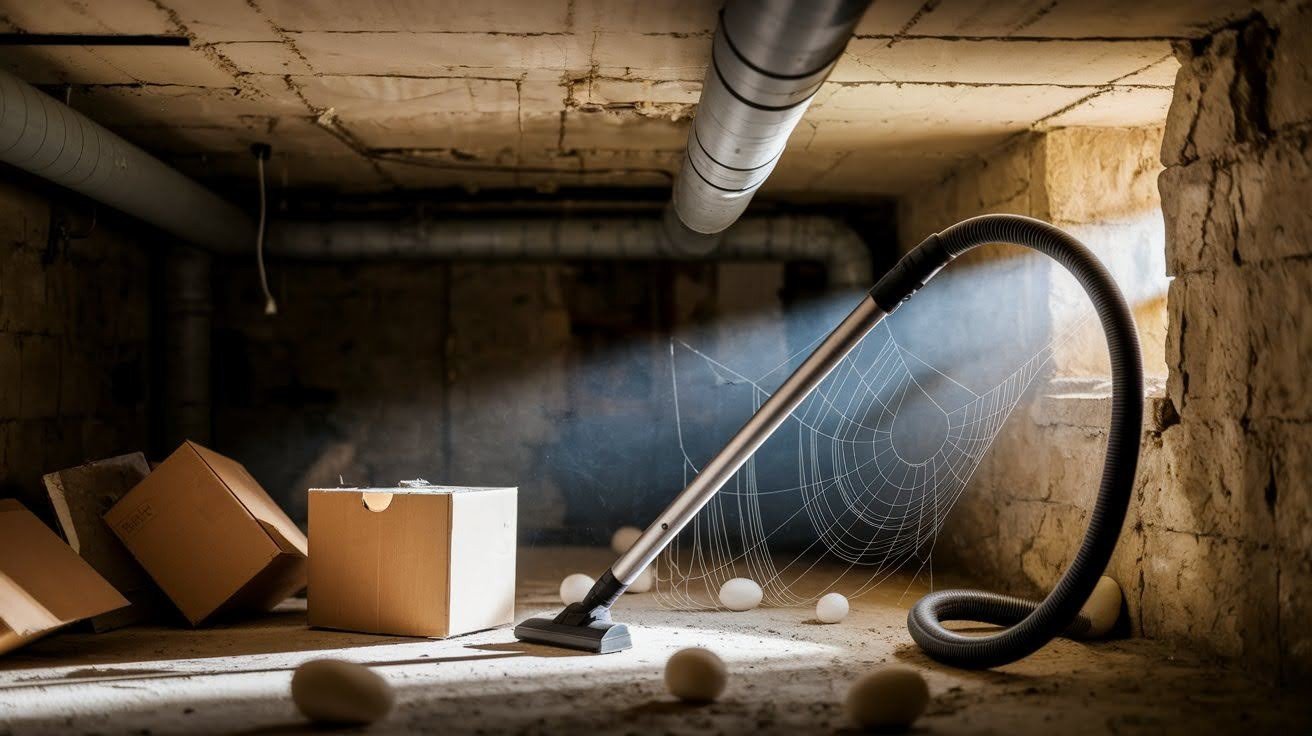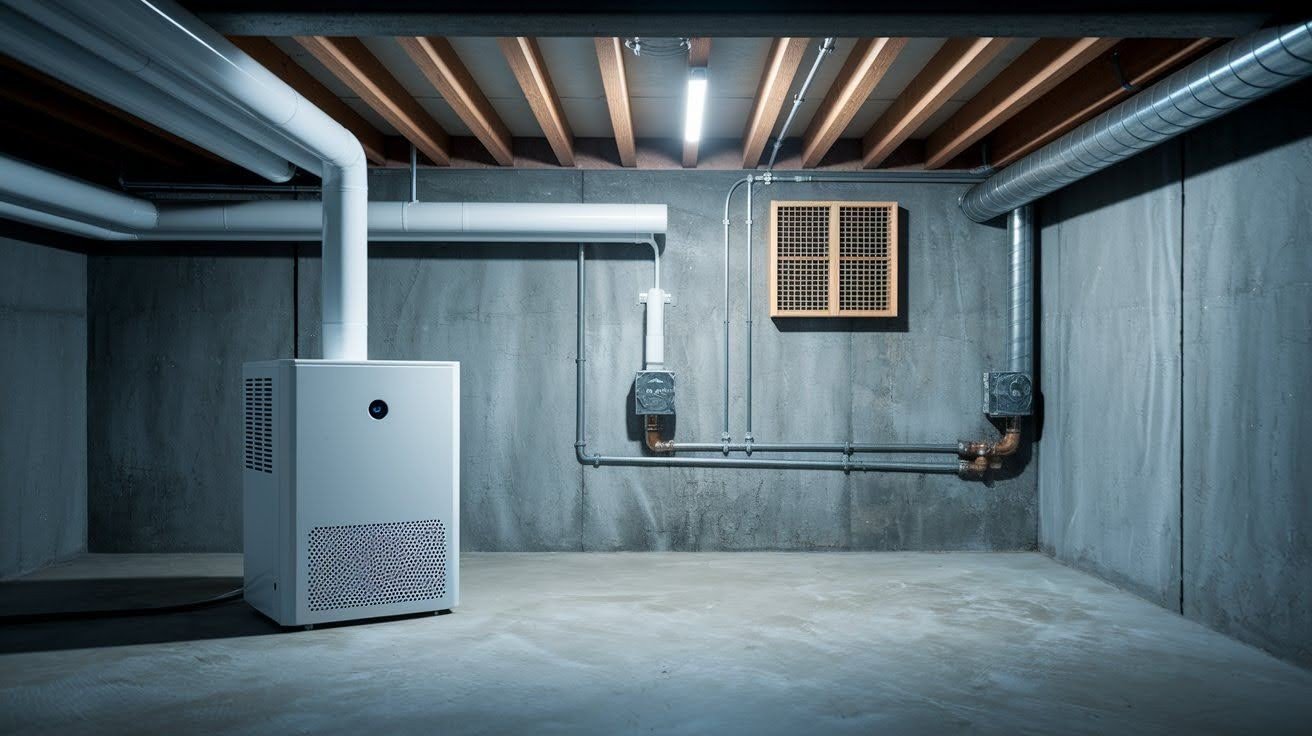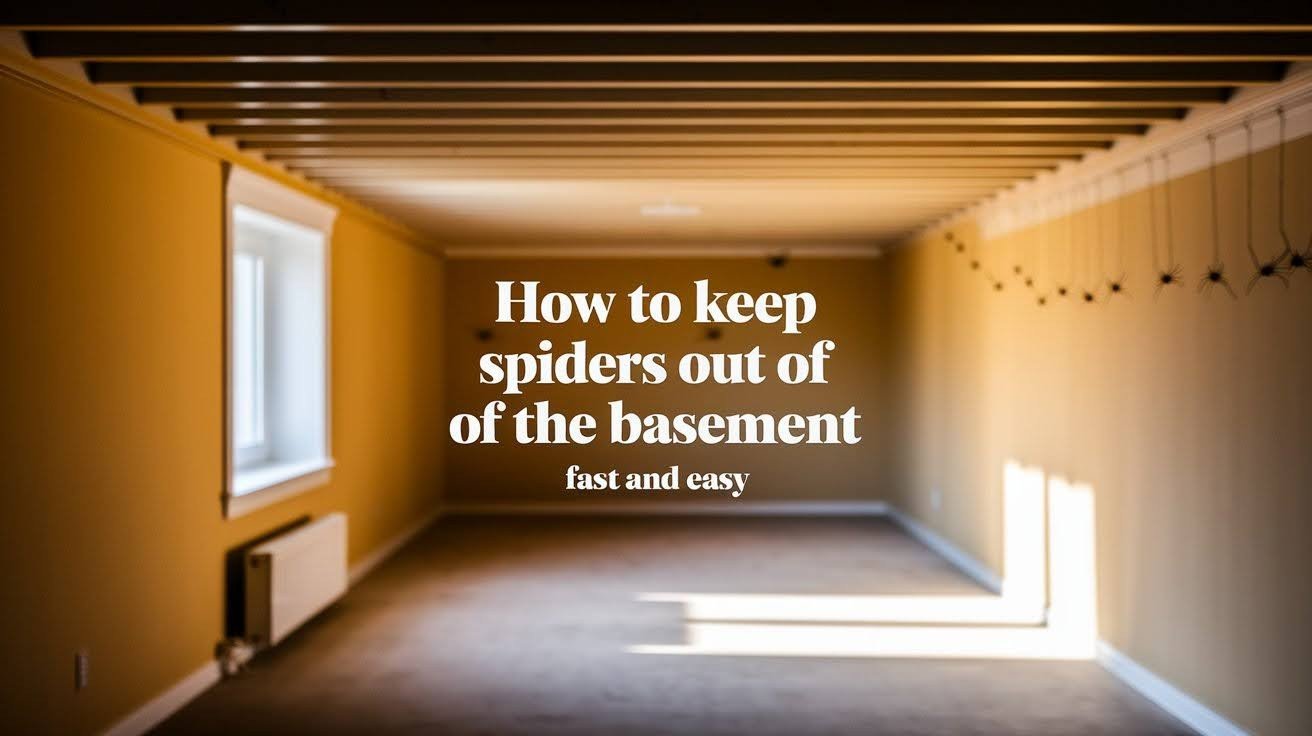Last month, I walked into my basement to grab holiday decorations. When I turned on the light, I saw thick webs in every corner and spiders scurrying away.
As a pest control expert with 15 years of experience, I knew this was a common problem many homeowners face.
Basements create the perfect home for spiders. They offer dark spaces, steady moisture, and plenty of food. Learning how to keep spiders out of basement areas starts with understanding why they move in.
This guide shares proven methods to remove current spiders and prevent new ones from moving in. You’ll learn natural solutions, sealing techniques, and when to call professionals.
Why Spiders Love Your Basement?

Understanding spider behavior helps you create better prevention plans. Basements offer three main things spiders need: shelter, food, and safety from predators.
The cool, dark environment mimics spiders’ natural habitat under rocks and logs. Most basements stay between 60-70°F year-round, which spiders prefer. Low light levels make them feel safe to build webs and hunt for food.
Basements also provide countless hiding spots in stored boxes, furniture, and wall cracks. Spiders can build webs undisturbed for months. They find easy entry through foundation cracks, window gaps, and door spaces. With little human activity, they multiply quickly without being bothered.
Quick Ways to Remove Existing Spiders

Before focusing on how to keep spiders out of basement areas long-term, you need to remove the ones already there. Start with a thorough cleaning to eliminate current spider populations and their egg sacs.
- Use a vacuum with a hose attachment to remove webs from corners and ceiling areas.
- Suck up visible spiders and egg sacs (small, round, white or brown clusters)
- Clean out storage areas and move boxes to check behind them
- Sweep or vacuum all floor cracks, window sills, and door frames
- Empty vacuum bags or containers outside immediately to prevent re-entry
After cleaning, wipe down surfaces with soapy water. This removes spider pheromones that attract other spiders to the same spots. Check your work with a flashlight to spot any missed areas.
Natural Methods to Keep Spiders Away
Many homeowners prefer natural solutions when learning how to keep spiders out of basement spaces. These methods work well and are safe around children and pets.
Vinegar and Citrus Solutions
White vinegar creates an acidic environment that spiders avoid. Mix equal parts water and white vinegar in a spray bottle. Spray this solution around window frames, door areas, and cracks where spiders might enter.
Fresh citrus peels work as natural repellents, too. Place orange, lemon, or lime peels near basement entry points. Replace them weekly as they dry out. The strong citrus smell masks other scents that attract spiders.
Many homeowners report good results with this method. The vinegar smell fades quickly for humans but stays strong enough to keep spiders away. Reapply weekly or after cleaning for best results.
Essential Oils and Natural Repellents
Peppermint oil is one of the most effective natural spider repellents. Mix 10-15 drops of peppermint oil with water in a spray bottle. Spray around basement windows, doors, and corners monthly.
Fresh mint leaves work similarly to peppermint oil. Place small bundles of mint near entry points and replace them when they dry out. Some people plant mint outside basement windows, but be careful, as mint spreads quickly.
Horse chestnuts (conkers) are another popular natural method. Place them on window sills and near doors. Replace them every few months as they dry out. While scientific evidence is limited, many homeowners swear by this old-fashioned method.
Sealing and Maintenance Strategies
Physical barriers are the most effective way to keep spiders out of basement areas permanently. Focus on finding and sealing all possible entry points where spiders might get inside.
- Check foundation walls for cracks and seal them with concrete caulk
- Install weather stripping around basement doors and windows
- Add door sweeps to exterior doors leading to basements
- Seal gaps around pipes, wires, and utility lines with expanding foam
- Replace damaged window screens and repair loose-fitting frames
- Apply caulk around window frames and door jambs annually
Regular maintenance prevents new entry points from forming. Walk around your basement monthly to check for new cracks or gaps. Fix small problems before they become bigger issues. Keep a maintenance log to track when you complete different sealing tasks.
Environmental Controls That Work
Changing basement conditions makes the space less appealing to spiders. Focus on moisture control and lighting changes to create an environment spiders want to avoid.
Humidity and Moisture Management

Spiders need moisture to survive, making humid basements perfect for them. Install a dehumidifier to keep humidity levels below 50%. This makes the space uncomfortable for spiders and reduces other insects they eat.
Fix any water leaks immediately, including dripping pipes, foundation seepage, or condensation issues. Even small amounts of standing water attract insects that spiders feed on. Check your basement after heavy rains for new moisture problems.
Improve air circulation with fans or vents to prevent moisture buildup. Good airflow also helps remove the musty smells that some insects find attractive. Clean air vents regularly to maintain proper airflow throughout the space.
Lighting and Landscaping Changes

Standard white lights attract flying insects, which then attract spiders. Replace regular bulbs with yellow or sodium vapor lights. These produce less attractive light wavelengths for most insects.
Keep vegetation trimmed back from basement windows and entry points. Overgrown bushes and tall grass provide hiding spots for spiders and the insects they hunt. Maintain at least two feet of clear space around your home’s foundation.
Remove leaf piles, wood stacks, and other debris near basement entries. These areas harbor both spiders and their food sources. Store firewood at least 20 feet from your house and keep it elevated off the ground.
When to Call Professional Help?
Some spider problems require professional treatment, especially when dealing with dangerous species or large infestations. Knowing when to call experts can save time and ensure safety.
If you find black widow or brown recluse spiders, contact professionals immediately. These species can cause serious medical problems with their bites. Professional exterminators have specialized equipment and safe treatments for dangerous spiders.
Large infestations with hundreds of spiders or constant web rebuilding suggest bigger problems. Professionals can identify the root cause and create comprehensive treatment plans. They also provide ongoing monitoring to prevent future issues.
Community Tips and Real Experiences
Learning how to keep spiders out of basement areas works better when you hear from other homeowners. These tried-and-tested methods come from real experiences dealing with spider problems.
- Sticky traps placed along basement walls catch spiders and help monitor problem areas.
- Food-grade diatomaceous earth sprinkled around entry points creates barriers that spiders avoid
- Cedar blocks placed in storage areas repel spiders naturally without chemicals.
- Regular vacuuming every two weeks prevents web buildup and removes egg sacs.
- Keeping basements well-lit discourages spiders from settling in corners
Many homeowners find success combining multiple methods rather than relying on just one approach. Seasonal prevention works best, with extra attention before fall when spiders look for winter shelter. The key is consistency in applying preventive measures.
Conclusion
Learning how to keep spiders out of basement spaces requires a multi-step approach. Start by removing existing spiders and cleaning thoroughly. Then focus on sealing entry points and changing environmental conditions.
Natural repellents work well for ongoing prevention, especially when combined with physical barriers. Regular maintenance and moisture control create long-term results. Don’t ignore signs of dangerous species or large infestations that need professional help.
Remember that prevention works better than treatment. Monthly basement checks and seasonal maintenance keep spider problems small and manageable. With consistent effort, you can enjoy a spider-free basement year-round.
Frequently Asked Questions
What Attracts Spiders to Basements in the First Place?
Basements offer dark, cool, moist conditions that spiders prefer. They also provide food sources like other insects and plenty of undisturbed hiding spots in clutter and cracks.
Are Basement Spiders Dangerous to Humans?
Most basement spiders are harmless house spiders or cellar spiders. However, black widows and brown recluses can be dangerous and require immediate professional attention if found.
How Often Should I Check My Basement for Spiders?
Inspect your basement monthly for webs, egg sacs, and live spiders. Increase checks to weekly during the fall when spiders seek winter shelter indoors.
Can I Use Chemical Sprays Safely in My Basement?
Use only products labeled for indoor basement use. Ensure proper ventilation and keep pets and children away. Natural methods are often safer alternatives.
Will Getting Rid of Other Bugs Help Reduce Spider Numbers?
Yes, removing spider food sources like flies, ants, and other insects will naturally reduce spider populations. Focus on integrated pest management for best results.






